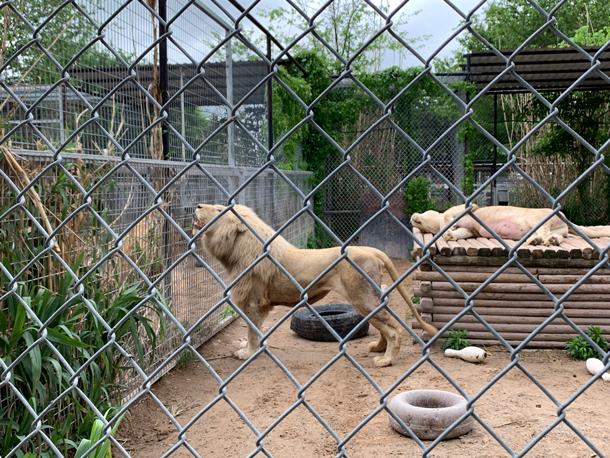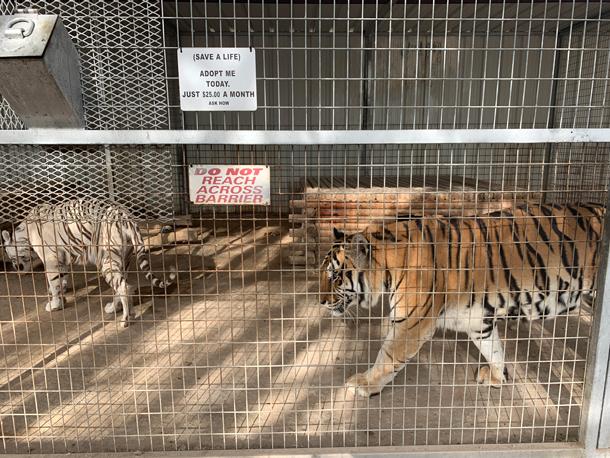Big cat ownership in the US is a big problem
The US Fish and Wildlife Service estimates that more tigers live in America than remain in the wild. Most live in small cages like the one pictured here.
“Tiger King,” the Netflix documentary series about the infamous tiger breeder Joe Exotic, has taken America by storm. But while the show may be entertaining to some, its subject is highly problematic: Private big cat ownership in the US is dangerous and the animals suffer greatly for the success or pleasure of their owners.
According to investigative journalist Rachel Nuwer, host of “Cat People,” a limited series podcast that explores big cat ownership in the United States, the US Fish and Wildlife Service estimates that more tigers live in the US than remain in the wild. Researchers think that about 4,000 tigers remain in the wild, so the number in the US is likely higher than that.
As crazy as it may seem, however, “we actually have no idea how many big cats are living here — in backyards, truck stops, even in people’s basements,” Nuwer said.
For Nuwer, big cat owners fall into one of three categories. The first is people who truly love these animals. They are often motivated by a desire to contribute to their conservation. “They think, ’These animals are endangered, so if I can have one, if I can make more, and keep them safe, I’m helping the survival of the species,'” Nuwer said.
In reality, personal ownership of big cats is not useful at all for conservation. Once any kind of exotic pet is snatched from the wild, whether it’s a lion, a tiger, or a lizard, “it’s dead, ecologically speaking,” Nuwer explained.
“It’s not playing any more role in its habitat, it’s not perpetuating the species,” she said. “They’re just over here in their little bubble, not helping conservation whatsoever.”
Related: China cracks down on wildlife trade amid coronavirus outbreak
The second category consists of the kind of people who might buy a Ferrari in order to show off. These are typically people “who want to stand out from their neighbors, who want something to affirm their uniqueness and their coolness and toughness in the world,” Nuwer explained. “[They’ll] start calling themselves, ‘the lion woman,’ or ‘the tiger man,’ and that’s what they become known for. It’s a way to assert themselves in the world.”
The last category of big cat owners consists of breeders and dealers. These are the Joe Exotics of the world, Nuwer says — the people who are in the business to make money. Unfortunately, Nuwer says, this industry is “built upon cruelty.”
“The reason there are so many pet tigers in the US is not necessarily because there are so many people who are dying to have a tiger. It’s because of this cub petting phenomenon,” she explained. “You go to these roadside zoos, you take a selfie with a tiger, you pay 100 bucks for 10 minutes to cuddle the cub. And then it’s the next person’s turn.”
“To produce all these cubs, female tigers are repeatedly speed bred,” Nuwer continued. “As soon as they have a litter of cubs, those cubs are taken away — often within an hour of their birth — and bottle fed. The cubs themselves have a terrible life. They often have ringworm, they’re malnourished, sometimes they’re drugged into submission, so they won’t be biting kids that are playing with them, or they’re just completely exhausted from being passed around all day long. So there’s definitely an element of animal cruelty in the industry.”

In the US, about two-thirds of states have laws banning big cat ownership, Nuwer says. About a dozen other states have laws that regulate ownership. Four states — North Carolina, Wisconsin, Nevada and Oklahoma — have no laws at all governing big cat ownership.
“I don’t know why you wouldn’t have laws about this,” Nuwer said. “I think people just haven’t really thought about it in the past, and more recently it’s become sort of like a states rights issue and an individual citizens rights issue — like, ‘you can’t take away my guns, you can’t take away my tigers’ kind of thing.”
Nuwer believes federal oversight of this issue is the answer. Luckily, she says “there is a very strong, ongoing effort” to make that happen. A bill called the Big Cat Public Safety Act is awaiting a vote in the House of Representatives.
The bill would ban all public contact with big cat species. “That means no more cub petting,” Nuwer said. “That would automatically cause the industry to dry up because people wouldn’t have any incentive to breed these big cats anymore. … And [the bill] would also slowly phase out big cat ownership.”
Nuwer thinks the bill has a good chance to pass because “it’s not just a tree-hugger, animal-lover issue.” For a lot of Republican lawmakers it’s an issue of public safety. Even a national sheriff’s organization has signed on to it.
“There’s a former police officer who’s really been championing it hard,” Nuwer said, “and when he gets pushback from policymakers … who say, ‘I don’t want to take away the rights of my constituents,’ he responds, “So, you’re not supporting police officers? You don’t want to protect police officers?” And that usually gets a reaction.”
This article is based on an interview by Bobby Bascomb that aired on Living on Earth from PRX.
